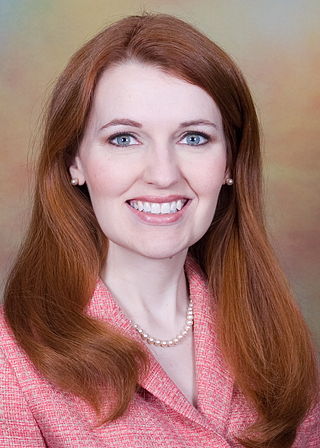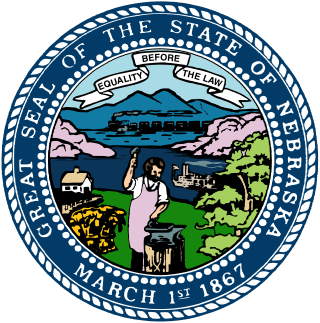Kate Witek is a former Nebraska Auditor of Public Accounts, member of the Nebraska Legislature, and candidate for Lieutenant Governor of Nebraska. She was first elected Nebraska State Auditor in November 1998 as a Republican. She was reelected in 2002 as a Republican but was defeated in her attempt for a third term in 2006 after switching to the Democratic Party.

The Nebraska Democratic Party is the affiliate of the Democratic Party in the state of Nebraska. Over 700 Democrats are elected across the state of Nebraska. Jane Kleeb is the chair of the Nebraska Democratic Party and also serves as the Midwest Chair of the Association of State Democratic Committees.

Amanda McGill Johnson is a politician from the state of Nebraska in the Midwestern United States. From 2007 to 2015, she represented a Lincoln district in the Nebraska Legislature. She has served on the Millard Public Schools Board of Education since 2017. In 2020, she published her first children's book Unicameral and You: Collaborating for the Common Good in Nebraska's Capitol.

The 2008 United States presidential election in Nebraska took place on November 4, 2008, as part of the 2008 United States presidential election. Voters chose five electors to the Electoral College, who voted for president and vice president. However, Nebraska is one of the two states of the U.S. that, instead of giving all of its electors to the winner based on its statewide results, allocates just two electoral votes to the winner of the statewide popular vote. The other three electors vote based on each congressional district's results.

The 1998 Nebraska gubernatorial election was held on November 3, 1998. Term limits prevented incumbent Governor Ben Nelson, a Democrat, from seeking a third term in office. Republican nominee Mike Johanns, Mayor of Lincoln, defeated Democratic nominee, attorney Bill Hoppner. As of 2024, this was the last gubernatorial election in Nebraska in which the margin of victory was within single digits. Johanns later served Nebraska in the United States Senate with Nelson from 2009 to 2013.

The 2014 Nebraska gubernatorial election took place on Tuesday, November 4, 2014, to elect the 40th Governor of Nebraska. Republican Candidate and former COO of TD Ameritrade Pete Ricketts defeated Democratic candidate and former Regent of the University of Nebraska Chuck Hassebrook, receiving 57.2% of the vote to Hassebrook's 39.2% This was the first open seat election, and the first time a Democrat won a county for governor since 1998.

The 2014 United States Senate election in Nebraska took place on November 4, 2014. Incumbent Republican Senator Mike Johanns did not run for re-election to a second term. Republican nominee Ben Sasse defeated Democratic nominee David Domina to succeed him.

A general election was held in the U.S. state of Nebraska on November 4, 2014. All of Nebraska's executive officers were up for election as well as a United States Senate seat, and all of Nebraska's three seats in the United States House of Representatives. Primary elections were held on May 13, 2014, for offices that require them.

In the 1990 Nebraska gubernatorial election, Democratic challenger Ben Nelson narrowly defeated first-term Republican incumbent Kay Orr for the governorship of the state of Nebraska.

The 2018 United States House of Representatives elections in Nebraska were held on Tuesday, November 6, 2018, to elect the three U.S. representatives from the U.S. state of Nebraska; one from each of the state's three congressional districts. Primaries were held on May 15, 2018. The elections and primaries coincided with the elections and primaries of other federal and state offices.

A general election was held in the U.S. state of Nebraska on November 6, 2018. All of Nebraska's executive officers were up for election as well as a United States Senate seat, and all of Nebraska's three seats in the United States House of Representatives.

The 1946 Nebraska gubernatorial election was held on November 5, 1946, and featured former school superintendent and newspaper publisher Val Peterson, a Republican, defeating Democratic nominee, state Senator Frank Sorrell.
The Nebraska Treasurer is the chief financial officer in the U.S. state of Nebraska.

The 2020 United States House of Representatives elections in Nebraska was held on November 3, 2020, to elect the three U.S. representatives from the state of Nebraska, one from each of the state's three congressional districts. The elections coincided with the 2020 U.S. presidential election, as well as other elections to the House of Representatives, elections to the United States Senate and various state and local elections.

The 2022 Nebraska gubernatorial election took place on November 8, 2022, to elect the next governor of Nebraska. Incumbent Republican governor Pete Ricketts was term-limited and unable to seek a third term. In the general election, Republican Jim Pillen won the gubernatorial election by a 23-point margin.

Elections were held in Illinois on Tuesday, November 3, 1964.

The 2022 Nebraska State Legislature elections took place as part of the biennial United States elections. Nebraska voters elected state senators in the 24 even-numbered seats of the 49 legislative districts in the Nebraska Unicameral as well as in a special election for the 31st District. State senators serve four-year terms in the unicameral Nebraska Legislature.

The 2022 United States House of Representatives elections in Nebraska were held on November 8, 2022, to elect the three U.S. representatives from the state of Nebraska, one from each of the state's three congressional districts. The elections coincided with the Nebraska gubernatorial election, as well as other elections to the U.S. House of Representatives, elections to the U.S. Senate, and various state and local elections.
The Government of the U.S. State of Nebraska, established by the Nebraska Constitution, is a republican democracy modeled after the Federal Government of the United States. The state government has three branches: the executive, the legislative, and the judicial. Through a system of separation of powers, or "checks and balances," each of these branches has some authority to act on its own, and also some authority to regulate the other two branches, so that all three branches can limit and balance the others' authority. The State Government is based in Lincoln, the capital city of Nebraska.

The 1872 Nebraska gubernatorial election was held on October 8, 1872. Three-term incumbent Governor of Nebraska David Butler was impeached and removed from office on June 2, 1871. Because Nebraska's Constitution at the time did not have an office of lieutenant governor, Butler was replaced by Nebraska Secretary of State William H. James as acting governor, filling out the remainder of Butler's term. In 1872, James decided not to seek election to the governorship. The election of 1872 thus featured Republican nominee Robert Wilkinson Furnas, a member of the University of Nebraska board of regents since 1869, defeating Democratic nominee Henry C. Lett, a lawyer from Brownville, Nebraska.






